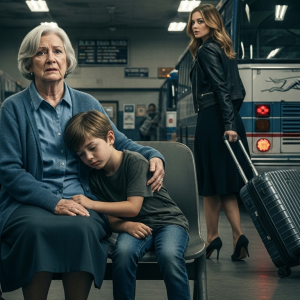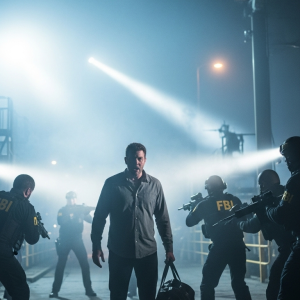Officer Ben Carter believed in foundations. As a cop, he believed in the foundation of the law. As a man, he believed in the foundation of his family, a structure built from the ashes of tragedy by his stepfather, Richard. Richard wasn’t just the man who had married his widowed mother; he was the architect of Ben’s life, a pillar of the community, a model of integrity and strength.
Ben was on patrol, the familiar rhythm of the city a comforting metronome to his thoughts, when his phone buzzed. It was his mother, Sharon.
“Hi, honey,” her voice was a little shaky, a little distant. “I just… wanted to hear your voice.”
“Everything okay, Mom?” he asked, a familiar, low-grade concern prickling at him. She’d been anxious for months, a quiet, withdrawn version of her former self.
“Oh, yes, of course. Just thinking. It’s… it’s the anniversary tomorrow, you know.” She didn’t have to say which one. The anniversary of the car accident that had killed his biological father twenty years ago, when Ben was just eight. “Your father… he was such a trusting man. Too trusting, sometimes.”
“I know, Mom,” Ben said softly. “But we were lucky. Richard stepped in. He saved us.” It was the family mantra, the story they had told themselves for two decades. Richard, his father’s junior business partner, had not only kept the company from collapsing but had also taken on the burden of a grieving widow and a lost little boy.
“Yes,” Sharon said, her voice trailing off. “He certainly… took care of everything.” There was an odd, chilling emphasis on the words that Ben couldn’t quite decipher. He chalked it up to the melancholy of the date.
He ended the call and thought of Richard, the man he called Dad. He remembered Richard patiently teaching him how to throw a curveball in the sprawling backyard of the house his success had bought them. He remembered Richard’s steady hand on his shoulder at his police academy graduation. Richard’s control over their lives had always felt like a comforting embrace, a benevolent stewardship. He managed the family finances, the trust his biological father had left, and even his mother’s social calendar, all under the guise of “letting her move on” and “not burdening her with the details.”
The memory of his real father was a faded watercolor, a collection of gentle, smiling ghosts. Richard, with his firm, decisive presence, was the solid reality. He was the foundation. And Ben Carter had never had a single reason to question its strength.
The call came in just after dusk, during the quiet lull between the end of the workday rush and the beginning of the night’s troubles. Ben was finishing up paperwork at the precinct, the air thick with the scent of cheap coffee and disinfectant.
“All units, be advised,” the dispatcher’s voice crackled over the radio, calm and routine. “Receiving a 911 hang-up. Possible domestic disturbance at 417 Oak Hollow Lane. Neighbor reports shouting, then silence.”
Ben’s pen froze mid-sentence. 417 Oak Hollow Lane. It couldn’t be. He must have misheard. That was his home. His childhood home. The house where his mother and Richard still lived.
He keyed his mic, his voice tight. “Dispatch, this is Carter in 3B12. Can you confirm that address?”
“Affirmative, 3B12. 417 Oak Hollow. Is there an issue?”
“No issue,” Ben lied, his heart beginning to hammer against his ribs. “I’m five minutes out. I’ll take the call.” It was a prank. A swatting attempt. It had to be. Domestic disturbance? At his parents’ house? It was unthinkable. Richard and Sharon never even raised their voices to each other.
The five-minute drive was the longest of his life. The familiar, tree-lined streets of his youth seemed alien, menacing. Every perfect lawn, every warm light glowing in a window, felt like a scene from a life that was about to be irrevocably shattered. He pulled up to the curb, the flashing lights of his patrol car painting the pristine white facade of the house in surreal strokes of red and blue.
He approached the house, his training battling the frantic, terrified thumping of his son’s heart. The front door was slightly ajar. That was wrong. Richard was meticulous about security. Ben pushed the door open, his hand resting on the butt of his service weapon.
The house was silent, but it was a heavy, suffocating silence. He heard it then. A soft, choked sound from the living room. The sound of his mother weeping.
He rounded the corner and the world stopped. The scene before him was a grotesque violation of every memory he held dear. His mother, Sharon, was crumpled on the floor at the foot of the stairs, her hand pressed to her cheek, a dark, ugly bruise already beginning to form. And standing over her, his face a mask of cold, unfamiliar fury, was Richard. The man he idolized. His father.
For a long, frozen second, Ben was not a cop. He was just a boy, seeing his mother hurt, a primal rage and confusion warring within him. Then, two decades of training slammed into place. The scene resolved into its basic, brutal components: a victim, an assailant, a threat.
His movements were fluid, automatic. He drew his weapon, the click of the safety echoing in the silent room. “Police! Don’t move! Show me your hands! Get on the ground! Now!” The words were his, but they felt like they were coming from a stranger.
Richard’s head snapped up, his eyes wide with shock as he saw Ben. The cold fury on his face instantly melted away, replaced by a look of pained, manipulative concern.
“Ben, son, thank God,” he said, taking a step towards him, his hands raised in a placating gesture. “Put the gun down. It’s not what it looks like. Your mother… she’s not well. She had a… an episode. She fell.”
The lie was so smooth, so practiced. For a horrifying half-second, Ben almost believed him. His world was tilting, and Richard’s voice was the only familiar anchor. But then, his mother looked up.
Her eyes, swimming with tears, found his. She saw the gun, the uniform, the terrible conflict on his face. And through a choked sob, she uttered the words that destroyed his world. It was a phrase he hadn’t heard in twenty years, a piece of a life he thought was long buried.
“Benny…” she whispered, her voice a ragged, desperate plea. “The lighthouse is broken.”
The world didn’t just tilt; it shattered into a million pieces. The phrase was a ghost, a secret code from a forgotten language.
He was seven years old, sitting on his father’s lap in the study. His real father. His father pointed to a small, framed photo of a lighthouse on the coast. “Listen to me, Benny,” his father had said, his voice serious but kind. “Sometimes, things can go very, very wrong. And you might not have the words to explain it. If you ever hear me or your mom say ‘the lighthouse is broken,’ it means the worst has happened. It means there’s a danger we can’t name. It means the foundation is gone, and you need to get help. It’s our secret, okay? Our emergency signal.”
The foundation is gone.
The code word sliced through Richard’s lies like a razor. Ben’s hand, which had begun to tremble, was now rock steady. The man in front of him was no longer his father. He was a threat. The target.
“On the ground,” Ben repeated, his voice now devoid of any emotion but the cold, hard certainty of his duty. “Now.”
Richard stared at him, seeing the shift in his eyes, knowing with a dawning panic that his spell was broken. He slowly, reluctantly, knelt and then lay flat on the expensive Persian rug. Ben moved forward, holstered his weapon, and pulled out his cuffs. The metallic click as he secured the restraints around the wrists of the man he had called Dad for twenty years was the sound of his entire life breaking in two.
The arrival of his fellow officers was a blur of muted shame and procedural numbness. Ben recited the facts of the domestic assault with a detached professionalism that felt like a betrayal of his own exploding heart. He watched as they led Richard, now silent and ashen-faced, out of the house and into the back of a patrol car. The perfect, respected family of 417 Oak Hollow Lane was now a crime scene.
He was left alone with his mother. An EMT had checked on her, confirming she had no serious injuries beyond the bruising and the deep, soul-crushing shock. She sat wrapped in a blanket on the sofa, trembling.
“He knows,” she whispered, her voice barely audible. “He knows I know everything.”
“Know what, Mom?” Ben asked, kneeling in front of her. “What happened?”
The story came out in a torrent of guilt-ridden, terrified words. A few weeks ago, while looking for some old photo albums, she had accidentally discovered a hidden safe behind a false wall in Richard’s home office. After days of wrestling with her conscience, she had guessed the combination—the date of her first husband’s death.
“I don’t know why I did it,” she sobbed. “I just… I had this feeling. A terrible feeling I’ve been ignoring for years.”
Tonight, on the anniversary, fortified by her grief and a desperate need for answers, she had confronted him. She had asked him about the contents of the safe. And he had snapped. The violence was not a loss of temper; it was a desperate attempt to maintain control, to silence her.
She led Ben into Richard’s immaculate office, the room where Ben had received so much fatherly advice, and pointed to a section of ornate woodwork beside the fireplace. Ben found the seam and pulled. A heavy, soundproofed section of the wall swung inward, revealing a large, black metal safe. His mother gave him the date. He keyed it in, and the heavy door swung open.
It was not full of cash or jewelry. It was full of the truth. It was a tomb containing the ghost of his real father.
There was a thick file folder. Inside, he found the original, twenty-two-year-old partnership agreement for the company, signed by his father and a young, ambitious Richard. He found a series of damning financial documents, showing Richard systematically embezzling money in the months leading up to the accident.
Then he found the letter. It was a handwritten confession from a former employee, dated a year after the accident, detailing how Richard had paid him to tamper with the brakes on his partner’s car. The letter was a plea for more money, a desperate, pathetic piece of blackmail.
And at the very bottom, there was the final, most damning piece of evidence. A life insurance policy for one million dollars, taken out on Ben’s father, listing Richard not as the beneficiary, but as the paying party. The policy was dated three weeks before the fatal “accident.”
Ben sank into Richard’s expensive leather chair, the documents spread before him like the entrails of his life. Richard hadn’t saved his family from tragedy. He had orchestrated it. He hadn’t just married his partner’s widow; he had created her. Every memory, every kindness, every piece of fatherly advice from the last twenty years was now coated in the filth of this monstrous, foundational lie.
The legal destruction of Richard was as swift as it was total. The initial felony assault charge was quickly overshadowed by a far more horrifying indictment. With the contents of the safe, the cold case of Ben’s father’s death was reopened and solved in a matter of days. Richard, the celebrated entrepreneur and community leader, was charged with first-degree murder.
The confession letter from the former employee, now a terrified old man living in another state, became the prosecution’s cornerstone. The financial documents painted a clear picture of motive. Richard, facing a lifetime in prison with no possibility of parole, remained silent, his empire of lies crumbling around him. The company he had built on a foundation of murder collapsed under the weight of the scandal, its assets frozen, its name forever tarnished.
The social ruin was absolute. The story was a media sensation, a lurid, high-society tragedy. The man who had been lauded as a hero, a savior who had stepped in to rescue a shattered family, was exposed as a sociopathic monster.
But the true story was the quiet, psychological aftermath for Ben and his mother. Their lives had been a carefully constructed fiction, and its author was now in a cage. The man Ben had called Dad was the man who had murdered his father. The home he had grown up in was a crime scene. His entire identity, the very foundation of who he was, had been a lie.
Months later, after the trial had ended and the verdict had been delivered, Ben stood with his mother in a quiet, sun-dappled cemetery. They were in front of a simple, granite headstone that read: MICHAEL CARTER. BELOVED HUSBAND AND FATHER.
For twenty years, they had come here on this anniversary, their grief always filtered through the lens of Richard’s presence, their mourning subtly managed and directed. Now, for the first time, they were alone. The shadow was gone.
“I’m so sorry, Ben,” Sharon whispered, her hand resting on the cool stone. “I’m so sorry I didn’t see it. That I let that… that man raise you.”
Ben put his arm around his mother’s shoulders, a gesture of shared survival. “It wasn’t your fault, Mom. He fooled everyone. He fooled me.” He looked at the name carved into the granite. “We can remember him now,” he said, his voice thick with an emotion he was only just beginning to understand. “We can finally, really remember him.”
The destruction of the false family Richard had built was the terrible, necessary price for the freedom to reclaim their real one. The lies had been burned away, leaving only the painful, purifying truth. Ben Carter, the cop, had been forced to arrest the man he thought was his father, a horrifying act of duty that had, in the end, allowed Ben Carter, the son, to finally find the father he had truly lost.




